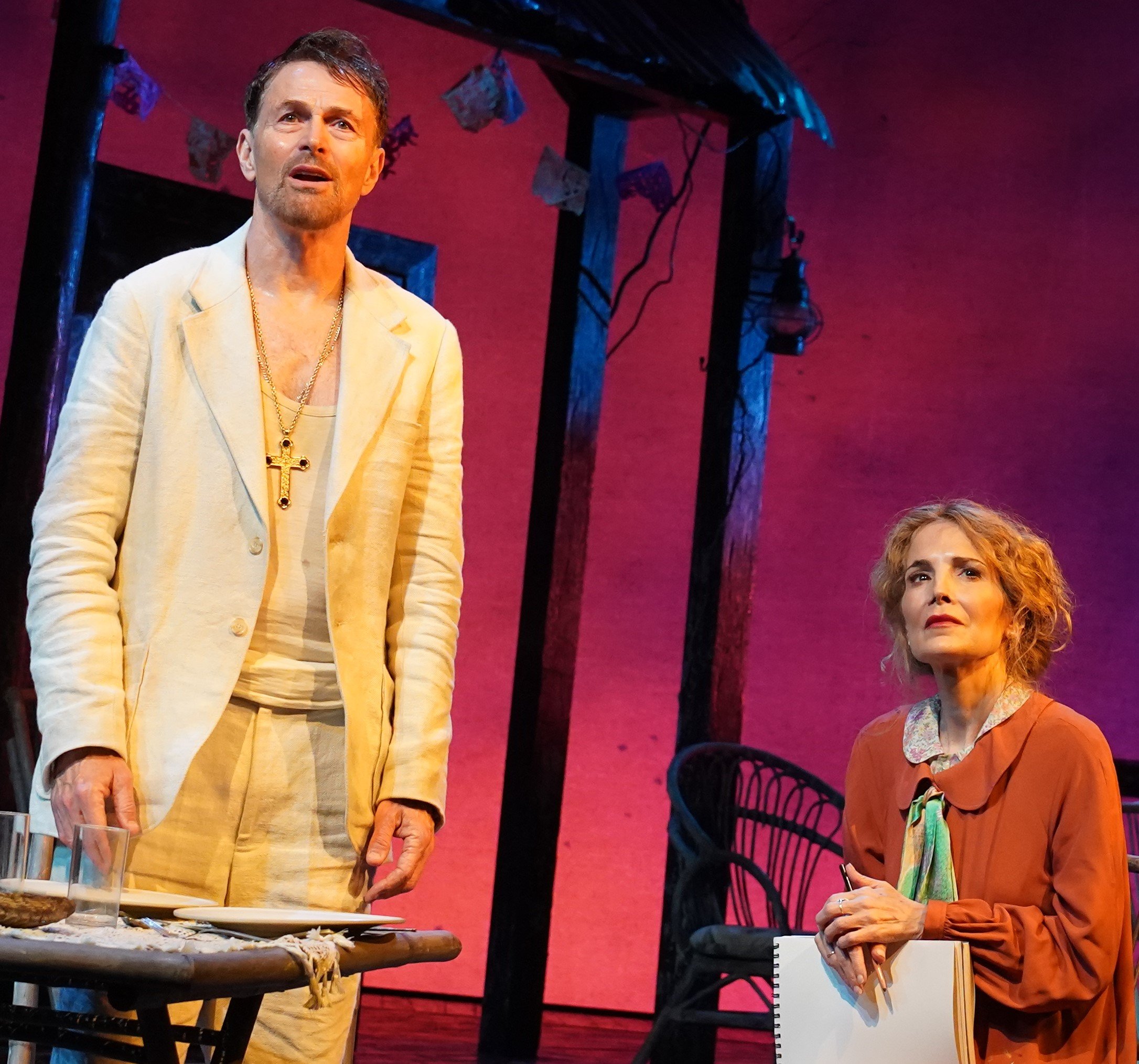Daphne Rubin-Vega (left) plays Maxine Faulk, the owner of a remote Mexican hotel, and Tim Daly is the Rev. T. Lawrence Shannon, a defrocked priest and recovering alcoholic, in Tennessee Williams’s The Night of the Iguana.
Tennessee Williams’s The Night of the Iguana is often considered his last great play, but the 1961 milestone was created amid stress and anguish. The role of Hannah Jelkes was written for Katharine Hepburn, but Spencer Tracy needed her care; Margaret Leighton played it and won a Tony. Bette Davis, difficult to imagine as the sensual Maxine Faulk, was at her most tyrannical during tryouts; she left the production after three months. Elia Kazan didn’t direct, though he lauded the work of Frank Corsaro, who did. In the end, however, the play survived, but La Femme Theatre Productions’ revival, the first in 28 years, demonstrates that pitfalls abound.
Jean Lichty (left) plays Hannah Jelkes, and Austin Pendleton is her 97-year-old grandfather, in Williams’s 1961 play.
The characters are Williams’s usual tarnished idealists—dreamers and romantics who find themselves at the end of their rope—like the titular iguana, captured and restrained for a future dinner. The central figure is T. Lawrence Shannon, a defrocked priest and recovering alcoholic who is conducting a tour of Mexico for a group of college women chaperoned by a Miss Fellowes. He brings them to a remote hotel which, he discovers, is now run by Maxine following the sudden death of her husband. Fellowes suspects that the changed itinerary is a swindle—she accuses Shannon of “the gyp touch.” More important, Shannon has had sex with one of Fellowes’s charges, a girl named Charlotte who’s just shy of 17; Fellowes’s deduction of it has turned her into an avenging Fury.
Director Emily Mann’s casting doesn’t always work. As Charlotte, the nubile teenager, the full-figured Carmen Berkeley looks at least 10 years older than the character, so that Shannon’s line “When I brought you home that night I … just kissed you on the cheek like the little girl that you are” registers as ludicrous. As Fellowes, Lea DeLaria, a fine singer and out comedienne, brings a bantam’s energy to her performance but lacks the technique to make the “butch” Fellowes more than a caricature. She plants her feet, sets her jaw, and crosses her arms to convey umbrage—she’s no match for the more experienced castmates.
Jeff Croiter’s lighting provides a backdrop for Shannon and Hannah to debate the existence of God.
The main conflict arises when Daphne Rubin-Vega’s lusty Maxine sets her cap for Shannon. She finds a sudden rival in Hannah Jelkes, a sketch artist who shows up with her “97 years young” grandfather, nicknamed Nonno, “a fairly well-known minor poet” (Austin Pendleton). The struggle between the earthy Maxine and the prim Hannah for Shannon—one wants his body and the other wants to soothe his spirit—is the engine of the play, and the wise Hannah has the edge.
Hannah: “Liquor isn’t your problem, Mr. Shannon.”
Shannon: “What is my problem, Miss Jelkes?”
Hannah: “The oldest one in the world—the need to believe in something or in someone—almost anyone—almost anything … something.”
In spite of occasional lapses in projection, Jean Lichty captures Hannah’s goodness and optimism, though her line that she’s “pushing 40” sparks a titter in the audience.
On the other hand, Daly’s age proves irrelevant: the script says Shannon is 35; at 67, Daly barely looks 50. He’s convincing as a man who is catnip to women, and his performance, hands trembling and his body exuding desperation, makes one wish he were on New York stages more often. He can toss off Williams’s bitchiest cracks too: “Maxine, honey, whoever told you that you look good in tight pants was not a sincere friend of yours.” There’s intentional humor as well in the Fahrenkopfs, a Hitler-loving German couple listening to reports of the Blitz—it’s 1940—but it misfires here. (It’s no help that Michael Leigh Cook looks and sounds like Basil Fawlty doing his worst Hun imitation.) For her part, Rubin-Vega has Davis’s bite but is surely a far comelier Maxine.
Miss Fellowes (Lea DeLaria, right) confronts Shannon. Photographs by Joan Marcus.
Jeff Croiter’s saturated lighting is superb, and Jennifer von Mayrhauser’s costumes falter only when Hannah appears in a print dressing gown with her long hair loose—she looks like Mary Pickford. Virginal, yes, but jarring.
The show’s greatest asset is Williams’s language. (The script is mostly intact, although an interpolated “Fuck you” is wrong for 1940, and bits of dialogue for Pendleton’s halting Nonno have been trimmed.) There is a depth of feeling in the writing, which includes the great speech that begins “Nothing human disgusts me.” The long Act III conversation between Shannon and Hannah often stalls the proceedings dangerously, and does here. One wishes that Williams had worked under better conditions to make the play indestructible. This production suggests that it’s not, but with different choices it could well have seemed so.
La Femme Theatre Productions’ The Night of the Iguana runs through Feb. 25 at the Pershing Square Signature Center (480 W. 42nd St.). Evening performances are at 7:30 p.m. Wednesday through Friday and at 8 p.m. on Saturday; matinees are at 2 p.m. Saturday and 3 p.m. Sunday (no matinee on Jan. 6 or 20). For tickets and more information visit iguanaplaynyc.com.
Playwright: Tennessee Williams
Director: Emily Mann
Scenic Design: Beowulf Borrit
Costume Design: Jennifer von Mayrhauser
Lighting Design: Jeff Croiter
Sound Design: Darron L West






